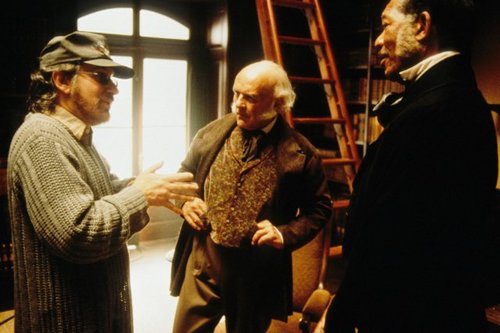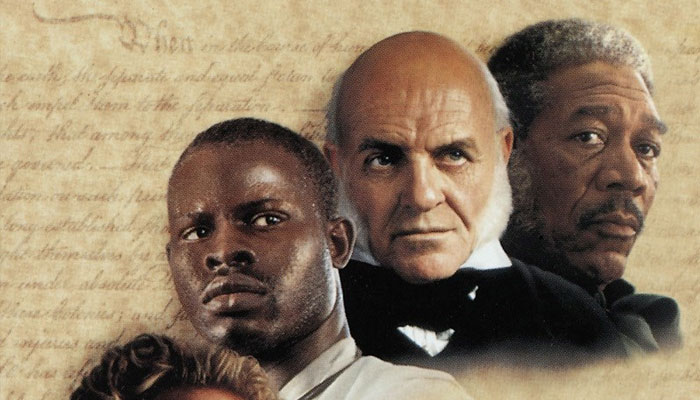1997 was shaping up to be a year similar to 1993 for director Steven Spielberg. Both years had him working on two films simultaneously, one a massive popcorn blockbuster and the other a harrowing historical drama. But if the one-two punch of twin successes JURASSIC PARK and SCHINDLER’S LIST were a career-high for Spielberg, then 1997’s double-feature was something of a letdown. THE LOST WORLD: JURASSIC PARK, while financially successful, was mostly a disappointment. During its production, Spielberg grew bored with the material and longed to return to the world of serious social drama, a genre that invigorated him and satisfied his creative cravings. At the same time, he was in full-on Producer mode, establishing an independent studio called Dreamworks with his colleagues David Geffen and Jeffrey Katzenberg. Meanwhile, David Franzoni (who would later write the Oscar-winning film GLADIATOR (2000)) had written a script called AMISTAD about the mutiny of a slave ship and the ensuing court case over their legal rights as people—a case that went all the way to the Supreme Court in 1841. Spielberg responded strongly to Franzoni’s script, and despite the poor reception of 1985’s THE COLOR PURPLE with black audiences, he felt compelled to make AMISTAD as his next film, getting right into it after wrapping production on THE LOST WORLD.
The year is 1839, and a slave ship called The Amistad is en route to Cuba. One night, a captive slave named Cinque (Djimon Hounsou) manages to free himself and his people from their shackles and take over the ship with murderous force. Without a crew to steer the ship, they are stranded at sea for several days, until an American ship rescues them and, upon discovering their mutiny, promptly throws them into prison in the port city of New Haven, Connecticut. Several parties lay claim to the prisoners, ranging from Queen Isabella of Spain (Anna Paquin) to a cadre of various property owners asserting their own claims on the captives. Enter an ambitious young real estate lawyer named Roger Sherman Baldwin (Matthew McConaughey), who sees not a civil property case, or a criminal case, but a case that gets to the very heart of the American principle of Freedom—and who is entitled to it. With the help of colleagues Theodore Joadson (Morgan Freeman) and former President John Quincy Adams (Anthony Hopkins), Baldwin launches an aggressive campaign to secure the prisoners’ liberty.

The great thing about helming a historical drama is a director like Spielberg gets to surround himself with a host of the finest actors around. Hounsou has the role of a lifetime as Cinque, the determined slave at the center of the story. He effectively channels the primal, tribal nature of his character, and his un-tempered ferocity is striking against the sophisticated forces of civilization against him. McConaughey’s real estate attorney Roger Sherman Baldwin is intellectual and insightful. McConaughey has been enjoying a career renaissance as of late, turning in several compelling performances for great directors (after a string of insipid, uninspired romantic comedies), but his knack for great characterization is evident even during his relatively early years. Revered thespian Anthony Hopkins is great casting as John Quincy Adams, who assumes a regal, frail frame possessed with an acerbic wit. By the time of AMISTAD, he’s already an ex-President, and now serves as a Congressman where he lives out his days aimlessly until he’s re-energized by the Amistad case. Hopkins turns in a masterful, Oscar-nominated performance that perfectly captures an admittedly evil-looking man with a sense of grace, dignity and righteousness befitting an American president. Morgan Freeman also gives an expectedly great performance as Theodore Joadson, an ex-slave turned free man/abolitionist who finds himself confronting his own demons in the wake of the Amistad case.
Spielberg fills out his supporting cast with some old faces, as well as some new. THE LOST WORLD alums Pete Postlethwaite and Arliss Howard were plucked from that film’s production to perform in AMISTAD as New Haven District Attorney Holabird and ex-Vice-President John Calhoun, respectively. Just as they were in THE LOST WORLD, they are antagonistic towards our heroes’ goals, but here they are much more humanized and richly-layered in their intentions. Anna Paquin is serviceable as Isabella, the bratty child queen of Spain. Chiwitel Ejiofer plays the important role of Ensign James Covey, the British translator between McConaughey and Cinque. His appearance here foreshadows his reportedly compelling, potentially-award-winning performance in Steve McQueen’s upcoming 12 YEARS A SLAVE. Stellan Skarsgard gives a good go at Tappan, a bank owner and McConaughey’s ally, but he’s lost in the clutter of Spielberg’s talented, yet crowded cast.
Cinematographer Janusz Kaminski returns to lens AMISTAD, bringing his signature aesthetic (deep wells of shadow against diffused, blooming highlights) to bear on Spielberg’s traditionally grandiose, David Lean-esque style. For a historical drama, the look is surprisingly atmospheric: shafts of light give an impressionistic vibe while an unflinching eye stands steadfast in the face of gore. Spielberg also uses colors in a meaningful way, with a cobalt blue tinting prison sequences that illustrates the somberness of the slaves’ plight. Conversely, the courtroom and aristocrat/bureaucrat sequences are rendered in warm, sunny tones to greater convey the contrast between classes. Spielberg’s camerawork is somewhat reserved, relying chiefly on dolly tracks to add production value while keeping an intimate degree of scale.
Also returning are Production Designer Rick Carter, Editor Michael Kahn, and musical maestro John Williams, all dedicated to subtly reinforcing Spielberg’s aesthetic. Williams bases his somber, elegiac score off of choral elements and primal drums that convey both the forces of religious Anglo-Saxon-dom and the African slaves. The effect is at once both harmonious and disharmonious. AMISTAD’s score is a fairly unmemorable one, but it does a good job of complementing the period trappings and tone of Spielberg’s vision.
There are several visual conceits that give away Spielberg’s hand: lens flares, silhouettes, low angle compositions, star fields, and the awe/wonder shot (manifested most concretely in the “give us free!” sequence). Spielberg’s continued reverence for and friendship with fellow director Stanley Kubrick is hinted at once again via a jarring match cut that occurs early in the film, whereby we cut from the face of a black prisoner to that of a pristine, white doll in Spain. While AMISTAD is visually in-line with Spielberg’s past work, it doesn’t retain some of his most consistent thematic preoccupations—there’s the noticeable absence of a child-based, innocent perspective or a strained father/son relationship. However, AMISTAD does continue Spielberg’s emergent exploration of people in persecution—a thematic conceit that arose with THE COLOR PURPLE and EMPIRE OF THE SUN (1987), and was masterfully depicted in SCHINDLER’S LIST. The emergence of this theme as a prominent aspect of Spielberg’s filmmaking can be traced back to the alienation he felt as a child due to his Jewish heritage.
While AMISTAD can be counted among Spielberg’s now-populous corner of serious “social issue” works, it didn’t make a splash like its counterparts have. AMISTAD received mostly positive reviews and moderate box office receipts upon its release, along with a few Oscar nominations (but no wins). Today, AMISTAD’s legacy is almost negligible compared to the rest of its genre, but on its own, it holds up as a compelling, finely-crafted historical drama.
Within the broad strokes of Spielberg’s career, AMISTAD feels less like a fully formed feature and more like a dress rehearsal for his 2012 opus LINCOLN (both films occur in a similar time period and have similarly bureaucratic storylines and stately tones). The film’s biggest contribution to Spielberg’s growth as a filmmaker is its existence as one of the first releases of Dreamworks Studios—the culmination of a dream between the director and several industry titans to make big films like the traditional studios, but on their own terms.
AMISTAD is currently available on standard definition DVD from Dreamworks.
Credits:
Produced by: Debbie Allen, Steven Spielberg, Colin Wilson
Written by: David Franzoni
Director of Photography: Janusz Kaminski
Production Designer: Rick Carter
Editor: Michael Kahn
Composer: John Williams
